人教版选择性必修第二册Unit4Journey Across a Vast Land grammar 分词作状语综合复习课件(25张ppt)
文档属性
| 名称 | 人教版选择性必修第二册Unit4Journey Across a Vast Land grammar 分词作状语综合复习课件(25张ppt) | 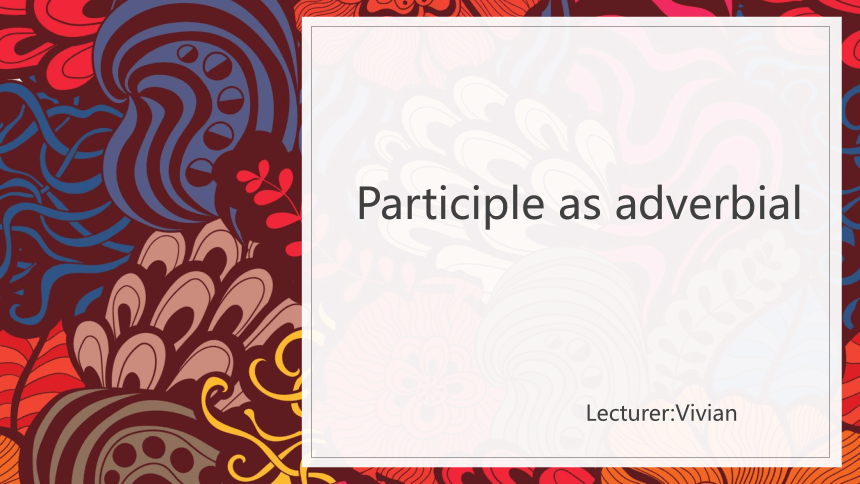 | |
| 格式 | zip | ||
| 文件大小 | 7.5MB | ||
| 资源类型 | 教案 | ||
| 版本资源 | 人教版(2019) | ||
| 科目 | 英语 | ||
| 更新时间 | 2022-05-05 12:50:35 | ||
图片预览

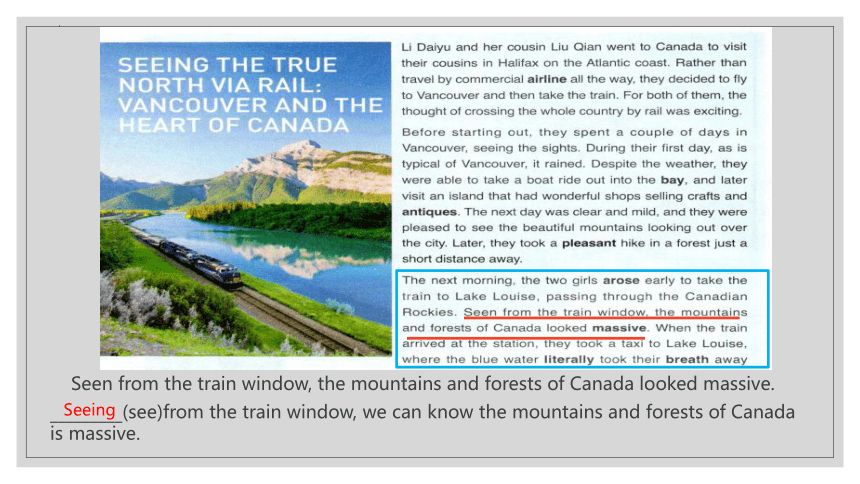
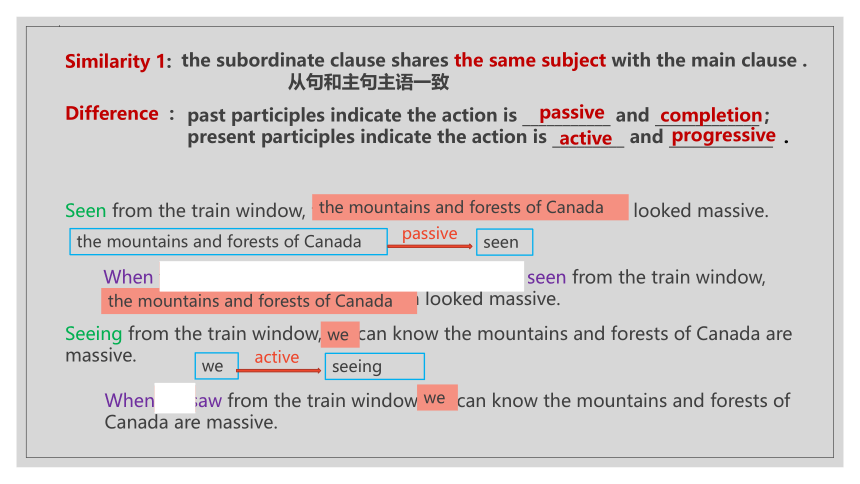
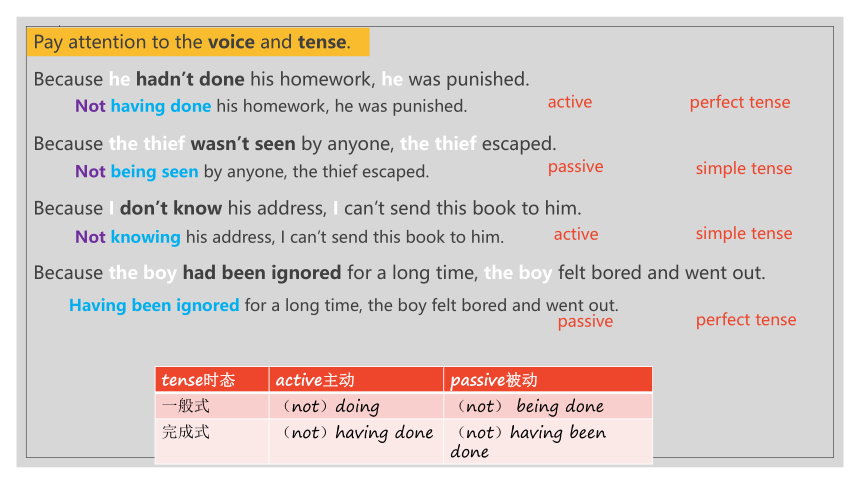
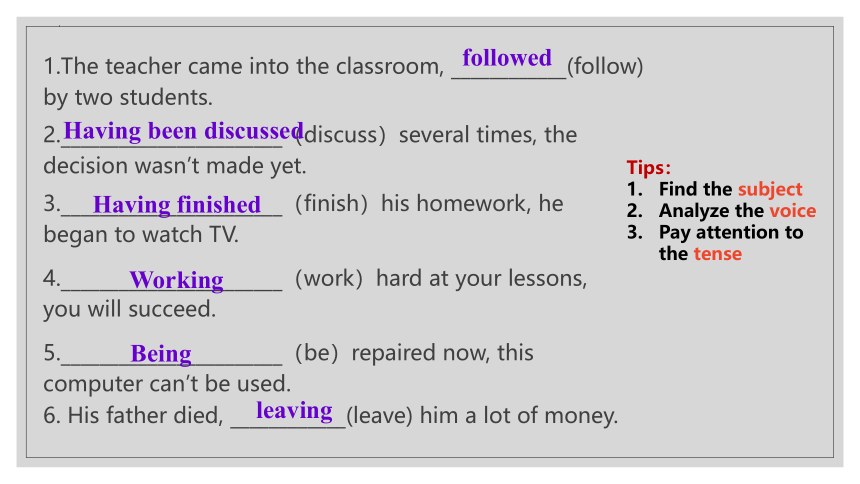
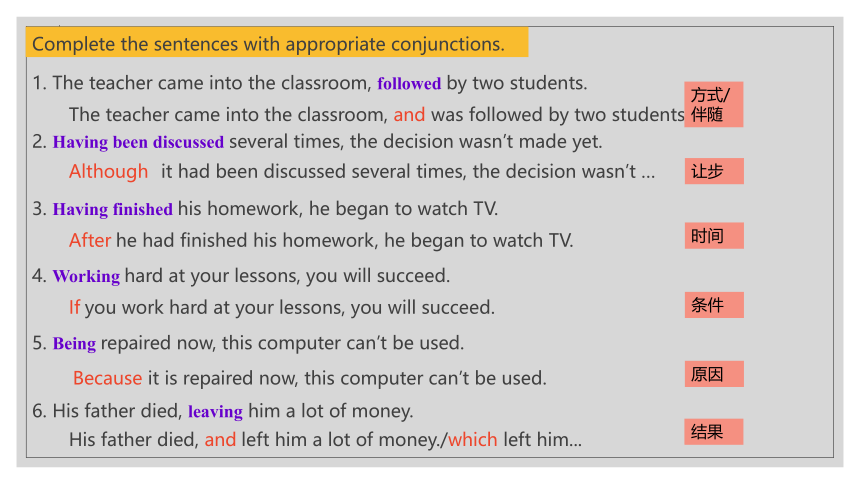
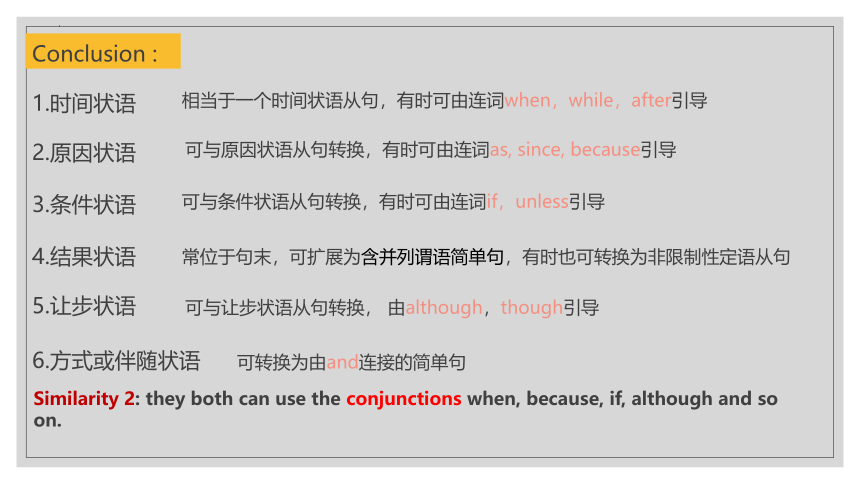
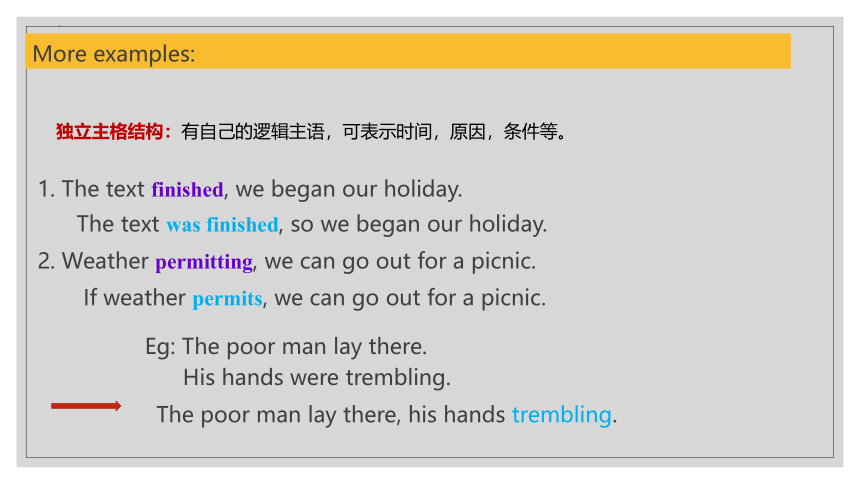
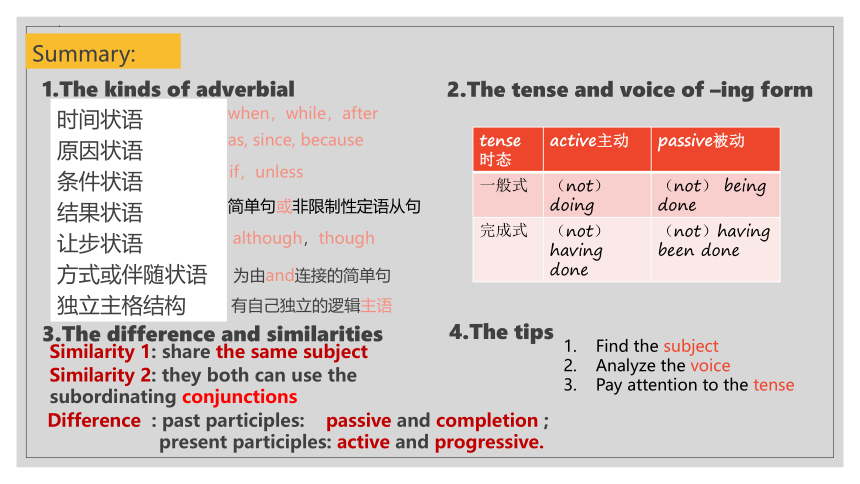
文档简介
(共25张PPT)
Participle as adverbial
Lecturer:Vivian
Seen from the train window, the mountains and forests of Canada looked massive.
_________(see)from the train window, we can know the mountains and forests of Canada is massive.
Seeing
Seen from the train window, the mountains and forests of Canada looked massive.
Seeing from the train window, we can know the mountains and forests of Canada are massive.
the mountains and forests of Canada
we
passive
active
When the mountains and forests of Canada were seen from the train window,
the mountains and forests of Canada looked massive.
When we saw from the train window, we can know the mountains and forests of Canada are massive.
the mountains and forests of Canada
the mountains and forests of Canada
we
we
Similarity 1:
Difference :
the subordinate clause shares the same subject with the main clause .
从句和主句主语一致
past participles indicate the action is ___________ and _____________ ;
present participles indicate the action is _________ and _____________ .
passive
completion
active
progressive
the mountains and forests of Canada
seen
we
seeing
Because he hadn’t done his homework, he was punished.
Because the thief wasn’t seen by anyone, the thief escaped.
Because I don’t know his address, I can’t send this book to him.
Because the boy had been ignored for a long time, the boy felt bored and went out.
perfect tense
Pay attention to the voice and tense.
active
passive
simple tense
active
simple tense
passive
perfect tense
tense时态 active主动 passive被动
一般式 (not)doing (not) being done
完成式 (not)having done (not)having been done
Not having done his homework, he was punished.
Not being seen by anyone, the thief escaped.
Not knowing his address, I can’t send this book to him.
Having been ignored for a long time, the boy felt bored and went out.
1.The teacher came into the classroom, ____________(follow) by two students.
followed
2._______________________(discuss)several times, the decision wasn’t made yet.
Having been discussed
3._______________________(finish)his homework, he began to watch TV.
Having finished
4._______________________(work)hard at your lessons, you will succeed.
Working
5._______________________(be)repaired now, this computer can’t be used.
Being
Tips:
Find the subject
Analyze the voice
Pay attention to the tense
6. His father died, ____________(leave) him a lot of money.
leaving
1. The teacher came into the classroom, followed by two students.
2. Having been discussed several times, the decision wasn’t made yet.
3. Having finished his homework, he began to watch TV.
4. Working hard at your lessons, you will succeed.
5. Being repaired now, this computer can’t be used.
Complete the sentences with appropriate conjunctions.
The teacher came into the classroom, and was followed by two students.
Although it had been discussed several times, the decision wasn’t …
After he had finished his homework, he began to watch TV.
If you work hard at your lessons, you will succeed.
Because it is repaired now, this computer can’t be used.
方式/伴随
让步
时间
条件
原因
6. His father died, leaving him a lot of money.
结果
His father died, and left him a lot of money./which left him...
1.时间状语
Conclusion :
相当于一个时间状语从句,有时可由连词when,while,after引导
2.原因状语
可与原因状语从句转换,有时可由连词as, since, because引导
3.条件状语
4.结果状语
5.让步状语
6.方式或伴随状语
可与条件状语从句转换,有时可由连词if,unless引导
常位于句末,可扩展为含并列谓语简单句,有时也可转换为非限制性定语从句
可与让步状语从句转换, 由although,though引导
可转换为由and连接的简单句
Similarity 2: they both can use the conjunctions when, because, if, although and so on.
1. The text finished, we began our holiday.
2. Weather permitting, we can go out for a picnic.
More examples:
The text was finished, so we began our holiday.
If weather permits, we can go out for a picnic.
独立主格结构:有自己的逻辑主语,可表示时间,原因,条件等。
Eg: The poor man lay there.
His hands were trembling.
The poor man lay there, his hands trembling.
时间状语
原因状语
条件状语
结果状语
让步状语
方式或伴随状语
独立主格结构
Summary:
when,while,after
1.The kinds of adverbial
as, since, because
if,unless
简单句或非限制性定语从句
although,though
为由and连接的简单句
2.The tense and voice of –ing form
tense时态 active主动 passive被动
一般式 (not)doing (not) being done
完成式 (not)having done (not)having been done
3.The difference and similarities
4.The tips
Similarity 1: share the same subject
Difference : past participles: passive and completion ;
present participles: active and progressive.
Similarity 2: they both can use the subordinating conjunctions
Find the subject
Analyze the voice
Pay attention to the tense
有自己独立的逻辑主语
Consolidation:
1. ________________(warn) many times, some people still throw cigarette ends everywhere.
Having been warned
Consolidation:
2.______ (give) more time, we could do it much better.
Given
Consolidation:
3._________(hear) their teacher’s voice, the pupils stopped talking at once.
Hearing
Consolidation:
4.The children ran out of the room, ___________________ (laugh and talk) happily.
laughing and talking
Consolidation:
5.The lecture________________(give) , a lively question-and-answer session followed.
having been given
Consolidation:
1. 因为在这个村里住了很多年,我熟悉每一个人。
_______________________________________ , I know everyone quite well.
Having lived in the village for many years
Consolidation:
2. 当你从山顶看的时候,这个公园看上去很美。
_______________________________________ , the park looks beautiful.
Seen from the top of the mountain
Consolidation:
3. 即使我被邀请了,我也不会去那个派对的。
_______________________________________ , I won’t take part in the party.
Even if invited
Consolidation:
4. 如果和你相比,我还有很大差距。
_______________________________________ , I still have a long way to go.
Compared with you
Consolidation:
5. 他被困在雨中,使得他感冒了。
He was caught in the rain,_______________________________________.
making him catch a cold
Consolidation:
1.Tom stood outside the door. He glanced at his watch from time to time.
Tom stood outside the door, glancing at his watch from time to time.
Consolidation:
2. We heard the news that we have won the match. We all jumped up. Tears of joy rolled down our cheeks.
Hearing the news that we have won the match, we all jumped up, tears of joy rolling down our cheeks.
Consolidation:
3. He saw the gold medal. He couldn’t conceal(掩饰) his excitement. His face cracked(裂开) into a broad smile.
Seeing the gold medal, he couldn’t conceal his excitement, his face cracking into a broad smile.
Consolidation:
4.Tom showed the gold medal to his father. His father gave him a thumbs-up.
His father said,“Congratulations!” (可适当加连词。)
When Tom showed the gold to his father, he give him a thumbs-up, saying,“Congratulations!”
Homework:
Finish the exercise about the participles as adverbials.
Thank you for your listening!
Participle as adverbial
Lecturer:Vivian
Seen from the train window, the mountains and forests of Canada looked massive.
_________(see)from the train window, we can know the mountains and forests of Canada is massive.
Seeing
Seen from the train window, the mountains and forests of Canada looked massive.
Seeing from the train window, we can know the mountains and forests of Canada are massive.
the mountains and forests of Canada
we
passive
active
When the mountains and forests of Canada were seen from the train window,
the mountains and forests of Canada looked massive.
When we saw from the train window, we can know the mountains and forests of Canada are massive.
the mountains and forests of Canada
the mountains and forests of Canada
we
we
Similarity 1:
Difference :
the subordinate clause shares the same subject with the main clause .
从句和主句主语一致
past participles indicate the action is ___________ and _____________ ;
present participles indicate the action is _________ and _____________ .
passive
completion
active
progressive
the mountains and forests of Canada
seen
we
seeing
Because he hadn’t done his homework, he was punished.
Because the thief wasn’t seen by anyone, the thief escaped.
Because I don’t know his address, I can’t send this book to him.
Because the boy had been ignored for a long time, the boy felt bored and went out.
perfect tense
Pay attention to the voice and tense.
active
passive
simple tense
active
simple tense
passive
perfect tense
tense时态 active主动 passive被动
一般式 (not)doing (not) being done
完成式 (not)having done (not)having been done
Not having done his homework, he was punished.
Not being seen by anyone, the thief escaped.
Not knowing his address, I can’t send this book to him.
Having been ignored for a long time, the boy felt bored and went out.
1.The teacher came into the classroom, ____________(follow) by two students.
followed
2._______________________(discuss)several times, the decision wasn’t made yet.
Having been discussed
3._______________________(finish)his homework, he began to watch TV.
Having finished
4._______________________(work)hard at your lessons, you will succeed.
Working
5._______________________(be)repaired now, this computer can’t be used.
Being
Tips:
Find the subject
Analyze the voice
Pay attention to the tense
6. His father died, ____________(leave) him a lot of money.
leaving
1. The teacher came into the classroom, followed by two students.
2. Having been discussed several times, the decision wasn’t made yet.
3. Having finished his homework, he began to watch TV.
4. Working hard at your lessons, you will succeed.
5. Being repaired now, this computer can’t be used.
Complete the sentences with appropriate conjunctions.
The teacher came into the classroom, and was followed by two students.
Although it had been discussed several times, the decision wasn’t …
After he had finished his homework, he began to watch TV.
If you work hard at your lessons, you will succeed.
Because it is repaired now, this computer can’t be used.
方式/伴随
让步
时间
条件
原因
6. His father died, leaving him a lot of money.
结果
His father died, and left him a lot of money./which left him...
1.时间状语
Conclusion :
相当于一个时间状语从句,有时可由连词when,while,after引导
2.原因状语
可与原因状语从句转换,有时可由连词as, since, because引导
3.条件状语
4.结果状语
5.让步状语
6.方式或伴随状语
可与条件状语从句转换,有时可由连词if,unless引导
常位于句末,可扩展为含并列谓语简单句,有时也可转换为非限制性定语从句
可与让步状语从句转换, 由although,though引导
可转换为由and连接的简单句
Similarity 2: they both can use the conjunctions when, because, if, although and so on.
1. The text finished, we began our holiday.
2. Weather permitting, we can go out for a picnic.
More examples:
The text was finished, so we began our holiday.
If weather permits, we can go out for a picnic.
独立主格结构:有自己的逻辑主语,可表示时间,原因,条件等。
Eg: The poor man lay there.
His hands were trembling.
The poor man lay there, his hands trembling.
时间状语
原因状语
条件状语
结果状语
让步状语
方式或伴随状语
独立主格结构
Summary:
when,while,after
1.The kinds of adverbial
as, since, because
if,unless
简单句或非限制性定语从句
although,though
为由and连接的简单句
2.The tense and voice of –ing form
tense时态 active主动 passive被动
一般式 (not)doing (not) being done
完成式 (not)having done (not)having been done
3.The difference and similarities
4.The tips
Similarity 1: share the same subject
Difference : past participles: passive and completion ;
present participles: active and progressive.
Similarity 2: they both can use the subordinating conjunctions
Find the subject
Analyze the voice
Pay attention to the tense
有自己独立的逻辑主语
Consolidation:
1. ________________(warn) many times, some people still throw cigarette ends everywhere.
Having been warned
Consolidation:
2.______ (give) more time, we could do it much better.
Given
Consolidation:
3._________(hear) their teacher’s voice, the pupils stopped talking at once.
Hearing
Consolidation:
4.The children ran out of the room, ___________________ (laugh and talk) happily.
laughing and talking
Consolidation:
5.The lecture________________(give) , a lively question-and-answer session followed.
having been given
Consolidation:
1. 因为在这个村里住了很多年,我熟悉每一个人。
_______________________________________ , I know everyone quite well.
Having lived in the village for many years
Consolidation:
2. 当你从山顶看的时候,这个公园看上去很美。
_______________________________________ , the park looks beautiful.
Seen from the top of the mountain
Consolidation:
3. 即使我被邀请了,我也不会去那个派对的。
_______________________________________ , I won’t take part in the party.
Even if invited
Consolidation:
4. 如果和你相比,我还有很大差距。
_______________________________________ , I still have a long way to go.
Compared with you
Consolidation:
5. 他被困在雨中,使得他感冒了。
He was caught in the rain,_______________________________________.
making him catch a cold
Consolidation:
1.Tom stood outside the door. He glanced at his watch from time to time.
Tom stood outside the door, glancing at his watch from time to time.
Consolidation:
2. We heard the news that we have won the match. We all jumped up. Tears of joy rolled down our cheeks.
Hearing the news that we have won the match, we all jumped up, tears of joy rolling down our cheeks.
Consolidation:
3. He saw the gold medal. He couldn’t conceal(掩饰) his excitement. His face cracked(裂开) into a broad smile.
Seeing the gold medal, he couldn’t conceal his excitement, his face cracking into a broad smile.
Consolidation:
4.Tom showed the gold medal to his father. His father gave him a thumbs-up.
His father said,“Congratulations!” (可适当加连词。)
When Tom showed the gold to his father, he give him a thumbs-up, saying,“Congratulations!”
Homework:
Finish the exercise about the participles as adverbials.
Thank you for your listening!
